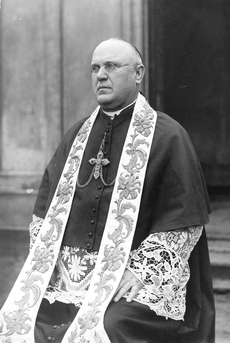Aleksander Kakowski
|
His Eminence Aleksander Kakowski |
|
|---|---|
| Cardinal, Archbishop of Warsaw | |
 |
|
| Church | Roman Catholic |
| Archdiocese | Warsaw |
| Appointed | 7 May 1913 |
| In office | 1913-1938 |
| Predecessor | Wincenty Teofil Popiel |
| Successor | August Hlond |
| Other posts | Cardinal-Priest of Sant’Agostino |
| Orders | |
| Ordination | 30 May 1886 |
| Consecration | 22 June 1913 by Stanisław Kazimierz Zdzitowiecki |
| Created Cardinal | 15 December 1919 by Benedict XV |
| Rank | Cardinal-Priest |
| Personal details | |
| Born |
5 February 1862 Dębiny, Płock Governorate, Congress Poland |
| Died | 30 December 1938 (aged 76) |
| Nationality | Polish |
| Coat of arms |  |
Aleksander Kakowski (Polish pronunciation: [alɛˈksandɛr kaˈkɔfskʲi]; 5 February 1862 – 30 December 1938) was a Polish politician, diplomat, a member of the Regency Council and, as Cardinal and Archbishop of Warsaw, the last titular Primate of the Kingdom of Poland before Poland fully regained its independence in 1918.
Aleksander Kakowski was born on 5 February 1862 in Dębiny near Przasnysz, the son of Franciszek Kakowski and Paulina Ossowska. He was ordained a priest on 30 May 1886 in Warsaw, by Cardinal Wincenty Chościak-Popiel. The following year he became one of the professors at the Warsaw Theological Seminary. In 1910 he became Rector of the Saint Petersburg Roman Catholic Theological Academy, and on 22 July 1913 he was ordained a bishop by Stanisław Zdzitowiecki. On 14 September 1913 he became the archbishop of Warsaw in St. John's Cathedral, thus becoming the titular primate of the Kingdom of Poland.
After the outbreak of the Great War he remained in Warsaw and in 1917 Kakowski was appointed to be a member of the Regency Council, a semi-independent and temporary highest authority of the Kingdom of Poland, recreated by the Central Powers as part of their Mitteleuropa plan. Kakowski was one of three members of that body, which served as a provisional head of state (hence the word "regency" in its name).
...
Wikipedia
